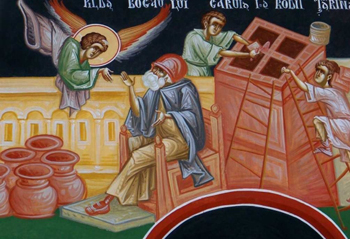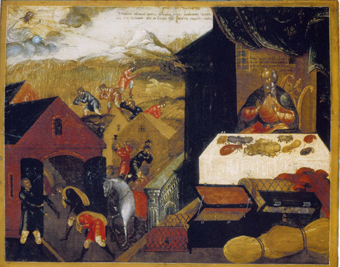For Sunday August 4, 2019
Lectionary Readings (Revised Common Lectionary, Year C)
Ecclesiastes 1:2, 12-14, 18-23
Psalm 49:1-12
Colossians 3:1-11
Luke 12:13-21
When I looked up the Gospel lesson for this week, I groaned, because I really, really, really don’t want to write about money. I mean, who does? Money is one of those things we’re not supposed to bring up in polite company. We get squirmy when people ask about it. Especially when they ask in ways that challenge our lifestyles or our priorities. For all sorts of reasons, we prefer talking about Christian virtues that are safely abstract — faith, hope, love, joy. But budgets? Retirement plans? Shopping habits? Tithes and offerings? Those are so specific. So concrete. So private. But here’s the thing: Jesus doesn’t care one whit about our middle class sensibilities. So here we go: money.
A man approaches Jesus and asks him to arbitrate a dispute he’s having with his brother: “Tell my brother to divide the family inheritance with me.” This is all the context we get, but the request sounds reasonable, doesn’t it? After all, the guy isn’t asking to inherit more than his brother; he just wants Jesus to advocate for basic fairness.
But here’s how Jesus responds: “Take care! Be on your guard against all kinds of greed; for one’s life does not consist in the abundance of possessions.” Wait — since when is desiring fairness the same thing as being greedy?
If that’s not confusing enough, Jesus keeps going, telling his listeners a parable about a rich landowner who carefully stores his wealth ahead of his retirement — only to learn that his life is about to end: “You fool! This very night your life is being demanded of you. And the things you have prepared, whose will they be?” Okay, I’m really confused now! What’s wrong with planning ahead? With saving for a rainy day? With making prudent choices when it comes to wealth management?
But hang on, there’s still more: Jesus concludes his parable with one more warning: “So it is with those who store up treasures for themselves but are not rich toward God.” What does that mean? What does it mean to be “rich toward God?”
 |
These are all hard and uncomfortable questions, and maybe the best we can do is wrestle with them. But for me, the biggest takeaway from this week’s Gospel lesson is this: I need to stop assuming that my nearest and dearest concerns are also necessarily Jesus’s. Like the man who seeks arbitration in the matter of his inheritance, I am a stickler for equity and fairness. Jesus isn’t. Like the rich man in the parable, I tend to think that I’m entitled to do what I want with my own hard-earned money. Jesus doesn’t agree. Like both men, I tend to compartmentalize my life into convenient “secular” and “sacred” realms, such that loving my brother (or sister, or neighbor) as myself has little bearing on my totally reasonable legal pursuits, and contemplating my mortality doesn’t require me to compromise my 401K. Again, Jesus sees things differently. Where I see in part, Jesus sees the whole. Where I see what’s pressing along the surfaces of my life, Jesus sees the depths of my heart. Where I obsess over the temporal, Jesus fights hard for the eternal.
Jesus looks at the man embroiled in a family feud over money, and sees that his obsessive need for a fair share is twisting, gnarling, and embittering his heart. In the heat of his pursuit, he’s not able to discern that his inner life is in trouble. He can’t see his own brother as anything more than an obstacle or a competitor. He’s so concerned about possible scarcity that he doesn’t even notice actual abundance (Jesus) standing right next to him. He’s so narrowly focused on his economic affairs that he has no bandwidth for the salvation Jesus offers. In his greed, he reduces the Son of God to an estate lawyer.
Meanwhile, Jesus looks at the rich landowner reveling in his stores of grain, and sees a person drowning in self-absorption. A man enamored of his own power. A man oblivious to his own mortality. Notice the narcissism of his inner dialogue: “I will do this: I will pull down my barns and build larger ones, and there I will store all my grain and my goods. And I will say to my soul, ‘Soul, you have ample goods laid up for many years; relax, eat, drink, and be merry.’” In the carefully curated narrative of a proud, self-made man, Jesus sees an isolated, insecure soul who has forgotten human connection, forgotten God’s generosity and provision, forgotten that possession is not stewardship, and forgotten that in the face of Death (the great equalizer) we are all naked paupers but for the grace of God.
 |
At this point, the temptation (for me) is to retreat into abstraction. Into metaphor. To say, “Well, this Gospel lesson is not literally about money. It’s about my attitude towards money. It’s about my heart. (It’s about faith and hope and love and joy!) Money itself is neither here nor there; money itself is morally neutral.
Well, yes. But also no. The squirmy fact is that Jesus talks about money and possessions more than just about any other topic. Why? Because there’s something about it that distorts us. Something that makes us defensive. Something that makes it very hard for us to hear the Gospel in its risky, scandalous, impolite, imprudent, and radical fullness. Something in its allure that grabs hold of us, and doesn't easily let go.
After all, how many of us pray, “Give us this day our daily bread,” and actually mean it? I don’t; I’ve got enough bread (and milk, cheese, fruit, vegetables, meat, and ice cream) in my refrigerator/freezer to last for weeks. How many of us really need to take material comfort in Jesus’s words about God clothing the lilies of the field? I don’t; I’m forever buying clothes I don’t need, and hauling bags of barely worn jeans and dresses to Goodwill to make myself feel better. It doesn’t occur to me too often that my unwillingness to make do (to quit shopping “just for fun,” to use up rather than upgrade, to consider other people’s needs today before I obsess over what I might need tomorrow) exacts a cost — a cost on our planet’s fragile ecology, a cost on the human beings who have to manage the fallout of my thoughtless purchases, and a cost on my soul.
I would like very much to backtrack at this point and say, “Please don’t be mad! I don’t mean to offend anyone. What you do with your money is entirely your own business.” But I’m stuck with the fact that Jesus almost surely offended the man who approached him in this week’s Gospel reading. The man came with an entirely reasonable request involving money, and Jesus turned that reasonable request on its head. Not only did he refuse to help the man secure his inheritance from his brother. He called the guy greedy and sent him packing. Ouch.
 |
Jesus concludes his lesson with an exhortation to be “rich toward God.” It’s a beautiful and inspiring phrase, but what does it mean? What does a heart (and a lifestyle, and a home, and a bank account) “rich toward God” look like? Maybe — if we can infer from the lectionary reading — it means guarding against greed instead of obsessing over fairness. Maybe it means holding our mortality closer than we want to. Maybe it means asking hard questions about what makes us feel secure or insecure. Maybe it means acknowledging that even our hard-earned, well-earned, self-earned wealth comes from God and belongs to God. Maybe it means prioritizing human interconnectedness over personal gain or asset management. Maybe it means dialoguing with God more ardently than we monologue with ourselves. Maybe it means holding human wisdom lightly, knowing that God’s wisdom will almost always render our own foolish.
In the parable Jesus tells, God confronts the rich landowner with the most chilling words: “This very night your life is being demanded of you.” Are we listening? What would change about our financial lives if we really believed this? What would we do differently if we believed that God does in fact demand our lives from us every single day, in every single way? Because he does, doesn't he? The call to take up my cross is a daily, hourly, minute by minute call. Is it also a dollar by dollar call? If our lives have in fact been demanded of us, then how should we live? What should we leave behind? What should we carry forward? What should we give away?
Be rich toward God. Don't shy away. Be brave and wrestle with what this invitation means, because the richness we spend on God is the only richness we’ll keep in the end.
Debie Thomas: debie.thomas1@gmail.com
Image credits: (1) OrthodoxPath.org; (2) Wikipedia.org; and (3) Emory University.





